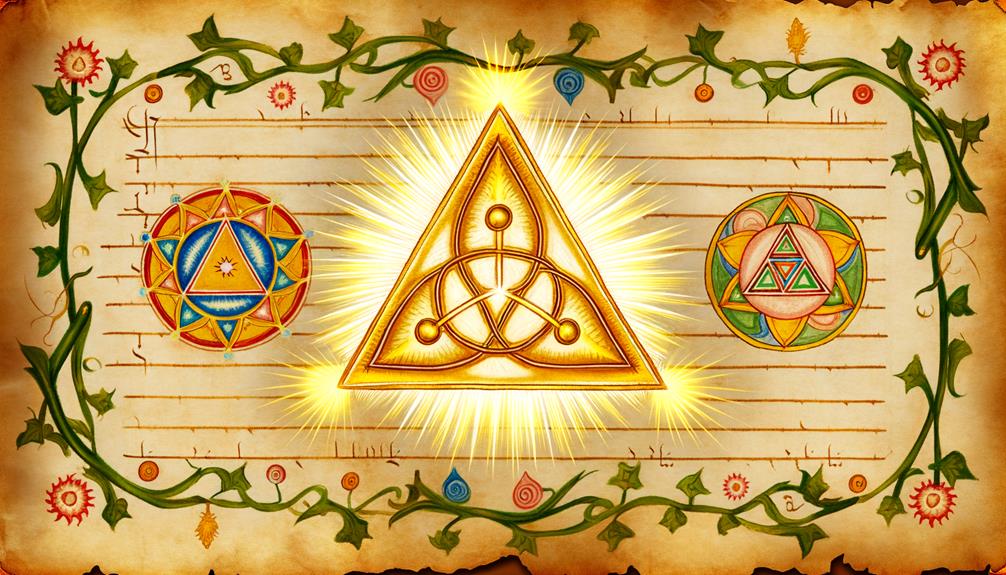Symbolic Meaning of Numbers in the Bible: Divine Order
The symbolic meaning of numbers in the Bible carries theological and historical depth, revealing divine truths and spiritual principles. For instance, one symbolizes God’s unity and indivisibility, two signifies duality and witness, and three represents the Holy Trinity.
Four denotes universality and creation, while five is associated with grace and abundance. Six signifies human labor and imperfection, contrasting with seven’s divine completeness and rest.
Eight symbolizes new beginnings, nine stands for finality and spiritual maturity, and ten embodies the completeness of God’s law and order. These symbolic meanings are essential for understanding biblical narratives and doctrines on a deeper level.

Symbolic Meaning of Numbers in the Bible: Spiritual Significance and Divine Messages
| Number | Biblical Meaning |
|---|---|
| 1 | Unity and God’s oneness. Represents the singularity and supremacy of God. (Deuteronomy 6:4) |
| 2 | Witness and testimony. Emphasizes the importance of agreement and confirmation, such as two witnesses. (Matthew 18:20) |
| 3 | Divine completeness and perfection. Symbolizes the Holy Trinity and resurrection (Father, Son, Holy Spirit). (Matthew 28:19) |
| 4 | Creation and the world. Represents the four corners of the Earth, seasons, and elements. (Revelation 7:1) |
| 5 | Grace and favor. Indicates God’s grace towards humanity, as seen in the five offerings in the Old Testament. (Ephesians 2:8) |
| 6 | Imperfection and humanity. Symbolizes man’s creation on the sixth day and represents human weakness. (Revelation 13:18) |
| 7 | Spiritual perfection and completion. Represents the fullness of God’s work, such as the seven days of creation. (Genesis 2:2) |
| 8 | New beginnings and resurrection. Signifies rebirth, new creation, and a fresh start after a period of rest. (2 Corinthians 5:17) |
| 9 | Divine completeness and finality. Represents spiritual maturity, the fruits of the Spirit, and judgment. (Galatians 5:22-23) |
| 10 | Order and law. Symbolizes completeness in a legal sense, as seen in the Ten Commandments. (Exodus 20:1-17) |
| 12 | God’s authority and divine government. Represents the 12 tribes of Israel and the 12 apostles. (Revelation 21:12-14) |
| 40 | Period of testing, trial, or judgment. Signifies preparation and transformation, like the 40 days of Jesus’ fasting. (Matthew 4:2) |
Number One

In biblical numerology, the number one symbolizes the concept of unity and the indivisibility of God’s singular nature. This notion is rooted in the Hebrew Shema, found in Deuteronomy 6:4, which proclaims, ‘Hear, O Israel: The Lord our God, the Lord is one.’
This verse underscores the monotheistic foundation of Judeo-Christian theology, emphasizing God’s uniqueness and supremacy. Historically, the number one also signifies the beginning or the primary, often representing the first creation, Adam, as the initial human being.
This primary position is echoed in the New Scripture, where Christ is depicted as the ‘firstborn over all creation’ (Colossians 1:15). Consequently, one encapsulates the essence of divine singularity, preeminence, and foundational beginnings within the biblical narrative.
Number Two

The number two holds significant theological and symbolic weight in the Bible, often representing duality and partnership, such as Adam and Eve, or the concept of witness and testimony, as seen in the requirement for two witnesses in legal matters (Deuteronomy 19:15).
Additionally, the number two can signify division and separation, exemplified by the separation of light and darkness in Genesis 1:4.
These themes underscore the multifaceted nature of biblical numerology, enhancing our understanding of scriptural narratives and principles.
Duality and Partnership
Number two in biblical numerology often symbolizes duality and partnership, reflecting the balance and relational dynamics inherent in human and divine interactions. This number signifies the divine intention for companionship and mutual support, as seen in Genesis 2:18 where God creates Eve as a partner for Adam, establishing the foundational human relationship.
Additionally, the duality aspect is evident in the Old and New Scriptures, representing the continuity and complementarity of God’s covenant with humanity. The concept of two witnesses in the teachings of Jesus (Matthew 18:20) underscores the importance of partnership in establishing truth and accountability.
Therefore, number two encapsulates a profound theological principle: the necessity of relational harmony and cooperation in fulfilling divine purposes.
Witness and Testimony
Rooted in biblical tradition, the concept of witness and evidence, often symbolized by the number two, underscores the necessity of corroboration and verification in establishing truth and justice.
The Old Scripture law, as seen in Deuteronomy 19:15, mandates the presence of two or three witnesses to confirm a matter, ensuring reliability and fairness. This principle is echoed in the New Scripture, where Jesus sends out His disciples in pairs (Mark 6:7) to testify to His teachings and miracles.
The dual witness represents a theological foundation for authenticating divine truth, reinforcing communal discernment. Historically, this underscores the importance of collective validation in faith communities, fostering a culture where truth is affirmed through shared, corroborated experiences.
Division and Separation
While the number two often symbolizes corroboration and unity in the context of witness and testimony, it equally represents division and separation, reflecting its dual nature in biblical numerology.
Historically, the creation narrative in Genesis highlights this duality, where God separates light from darkness (Genesis 1:4) and waters above from waters below (Genesis 1:7).
Theologically, two signifies the separation between the divine and the profane, as illustrated by the two tablets of the Law, distinguishing God’s commandments from human sinfulness.
In the New Covenant, Jesus’ sending of the disciples in pairs underscores both unity and the potential for divergent paths. This strategy not only emphasizes the strength found in companionship but also reflects the diverse missions and individual spiritual journeys that can arise from collective faith. Just as the symbolic significance of rivers in scripture often represents life’s journey and the flow of divine grace, the disciples were encouraged to navigate their unique paths while remaining grounded in their shared purpose. Their partnerships serve as a reminder that unity does not diminish individuality, but rather enhances the overall mission of spreading the Gospel.
Consequently, the number two encapsulates the profound biblical dichotomy between unity and division, offering a layered understanding of spiritual and earthly domains.
Number Three

The number three holds profound significance within biblical texts, representing the Holy Trinity—Father, Son, and Holy Spirit—fundamental to Christian theology.
It also symbolizes resurrection and renewal, as exemplified by Christ rising on the third day.
Historically, the recurrence of this number underscores its role in conveying completeness and divine perfection.
Trinity in Christianity
Christianity’s doctrine of the Trinity profoundly illustrates the symbolic importance of the number three, representing the unity of Father, Son, and Holy Spirit. This triune nature underscores a complex theological cornerstone shaping Christian dogma and practice. Historically, the doctrine emerged from the early Church’s attempts to articulate the interrelationship of these three distinct yet consubstantial persons.
The number three is emblematic in several key areas:
- The baptismal formula (‘in the name of the Father, and of the Son, and of the Holy Spirit’).
- Liturgical structures often feature triadic elements.
- The Nicene Creed affirms the co-equality of the three persons.
- Early Church Fathers extensively wrote to elucidate trinitarian theology.
This theological construct remains central to Christian identity and worship.
Resurrection and Renewal
In biblical symbolism, the number three frequently signifies resurrection and renewal, deeply rooted in the narrative of Jesus Christ’s resurrection on the third day. This pivotal event underscores the transformative power attributed to the number three, marking a shift from death to life.
Historically, the span of three days recurs in other biblical contexts, such as Jonah’s three days in the belly of the fish, symbolizing a period of trial followed by deliverance.
Theologically, the number three encapsulates a divine completeness and perfection, often seen in the structure of the Holy Trinity.
Understanding the number three’s role in the Bible enriches one’s grasp of its profound implications in themes of rebirth and spiritual restoration.
Number Four

Representing universality and creation, the number four in the Bible often signifies completeness and the world’s order. This number manifests through various biblical elements, underscoring its theological and symbolic significance.
The four directions (North, South, East, and West) encapsulate the entirety of the earth, suggesting inclusivity and totality. Similarly, the four living creatures in Ezekiel’s vision epitomize diverse facets of creation.
Key biblical references include:
- Four rivers flowing out of Eden, symbolizing the world’s nourishment.
- Four seasons indicating a complete cycle of time.
- Four gospels presenting a thorough portrayal of Jesus’ life.
- Four corners of the earth representing global scope.
Thus, the number four embodies a holistic view of God’s creation and governance.
Number Five
In biblical numerology, the number five is often associated with God’s grace, as reflected in the Pentateuch, the first five books of the Bible which lay the foundation for divine law and covenant.
This number also appears in the context of offerings, signifying the abundance of grace provided by God through various sacrificial rites and rituals.
Historically and theologically, five encapsulates a sense of completeness in God’s provision and favor toward humanity.
God’s Grace Manifested
The number five in biblical symbolism often signifies God’s grace, underscoring a divine favor that is unearned and freely given. This numerical representation is evident in several scriptural instances, portraying God’s benevolence towards humanity.
Biblically, the number five is associated with:
- The Five Levitical Offerings: Highlighting God’s provision for atonement.
- The Five Books of the Torah: Emphasizing foundational divine guidance.
- David’s Five Stones: Symbolizing God’s enabling power in overcoming adversaries.
- Jesus Feeding the Five Thousand: Manifesting divine compassion and provision.
These examples collectively underscore the theological principle that God’s grace is a foundational element of biblical teaching, revealing a consistent divine pattern of mercy and favor throughout scripture.
Symbolism in Offerings
Central to the biblical understanding of offerings, the number five signifies completeness and divine provision, especially evident in the Levitical offerings that encompass various aspects of atonement and worship.
The five primary types of Levitical offerings—burnt, grain, peace, sin, and guilt offerings—collectively represent a holistic approach to maintaining covenantal relationships with God.
Historically, these offerings served both practical and symbolic purposes, delineating the sacred from the profane.
Theologically, five underscores God’s provision for humanity’s spiritual needs, as seen in the five loaves that Jesus used to feed the multitude (Matthew 14:17–21).
This number’s repeated use underscores its significance in conveying God’s completeness and sufficiency in providing for and redeeming His people.
Number Six

While often associated with imperfection and human frailty, the number six in biblical literature is imbued with significant symbolic meanings that warrant thorough examination.
Traditionally, six is viewed as falling short of seven, which represents divine completeness. This makes six a representation of human limitations and the tendency toward sinfulness. Theologically and historically, six carries multifaceted implications:
Creation: Humanity was created on the sixth day (Genesis 1:26-31).
Work: The Israelites were instructed to work for six days and rest on the seventh (Exodus 20:9).
Bondage: The period of slavery for Hebrew servants was six years (Exodus 21:2).
Symbol of Evil: The number 666 is associated with the Beast in Revelation (Revelation 13:18).
Imperfection: Falls short of the number seven, symbolizing incompleteness.
Number Seven

In stark contrast to the imperfection symbolized by the number six, the number seven in biblical literature epitomizes divine completeness and spiritual perfection.
The creation narrative in Genesis uniquely highlights this, as God rested on the seventh day, sanctifying it as a day of rest and holiness. This sanctification extends to the Sabbath, a recurring theme of rest and renewal.
Additionally, the Book of Revelation features seven churches, seals, trumpets, and bowls, underscoring the significance of seven as a marker of divine orchestration.
Historically, the recurrence of this number in both Old and New Scriptures signals its deep theological resonance, reflecting an inherent connection to God’s overarching plan and the manifestation of divine order in the cosmos.
Number Eight

The number eight in biblical numerology often signifies new beginnings, regeneration, and a fresh start, as exemplified by the resurrection of Christ occurring on the eighth day, the day after the Sabbath.
This symbolism is further reinforced through various scriptural instances:
- Covenants: Circumcision, a sign of the covenant, occurs on the eighth day (Genesis 17:12).
- Feasts: The Feast of Tabernacles ends on the eighth day (Leviticus 23:36).
- Kingship: David, the eighth son of Jesse, was chosen as king (1 Samuel 16:10-13).
- Temple Dedication: Solomon’s temple was dedicated on the eighth day (2 Chronicles 7:9).
These examples underscore the theological and historical significance of the number eight in the Bible.
Number Nine

Number nine in biblical numerology is often associated with divine completeness, finality, and judgment, as evidenced by its recurrent appearance in contexts that signify the culmination of God’s plans and purposes.
For example, Christ died at the ninth hour (Mark 15:34), underscoring the completion of His earthly ministry and the fulfillment of redemption.
Additionally, the nine fruits of the Holy Spirit listed in Galatians 5:22-23 symbolize the completeness of a spiritually mature character.
Historically, the number nine is linked to the Day of Atonement, occurring on the ninth day of the seventh month (Leviticus 23:32), a time of ultimate reconciliation and judgment.
This confluence of scriptural references underscores nine’s role in representing theological finality and divine accomplishment.
Number Ten

Building upon the theological significance of nine,
ten in biblical numerology often symbolizes completeness of order, law, and human responsibility, as evidenced by the Ten Commandments given to Moses on Mount Sinai (Exodus 20:1-17). This divine decalogue establishes a fundamental moral framework, reflecting the completeness of God’s law.
Historically, the number ten appears in various significant contexts within Scripture, underscoring its thematic relevance:
- The Ten Plagues in Egypt (Exodus 7-12)
- The Ten Virgins parable (Matthew 25:1-13)
- The ten generations from Adam to Noah (Genesis 5)
- The ten talents in the Parable of the Talents (Matthew 25:14-30)
Each instance reinforces ten’s symbolism in conveying divine completeness and moral order.
Conclusion
In the biblical tapestry, numbers weave a rich, symbolic narrative that transcends mere arithmetic.
One symbolizes divine unity, reflecting a singular Almighty presence.
Two denotes partnership and testimony, while three signifies divine completeness and the Holy Trinity.
Four echoes creation’s wholeness, five represents grace, and seven epitomizes spiritual perfection.
Eight heralds new beginnings, nine conveys finality, and ten embodies law and order.
Together, these numbers form a mosaic of theological depth and historical resonance, illuminating sacred scripture’s profound layers.






